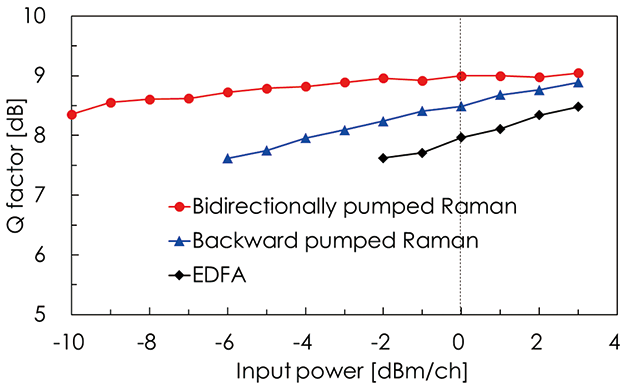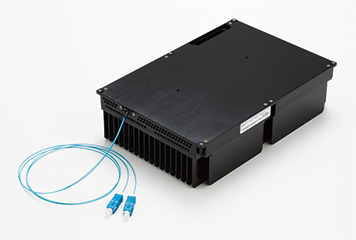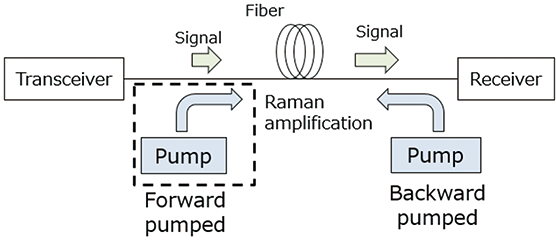Increased the 800Gbps optical signal quality in the C+L band through bidirectional Raman amplification using a Forward Raman Unit
- Developed a Forward Raman Unit essential for bidirectional Raman amplification in the C+L band
- With this method, the Q factor, which indicates the quality of the transmitted optical signal, has been increased by 0.5dB compared to backward Raman amplification and by 1.0dB compared to amplification with a standard optical amplifier (EDFA)
- The product and Forward Raman Unit will be exhibited at OFC 2024 scheduled to be held in March, and a report will be made at the technical conference
Furukawa Electric Co., Ltd. (Head office: 2-6-4 Otemachi, Chiyoda-ku, Tokyo; President: Hideya Moridaira) has increased the quality of optical signal transmission at 800Gbps in the C+L band using an optical transmission system equipped with a Forward Raman Unit.
Background
Raman amplification(note 1) is a supporting technology in optical fiber communication systems, and backward pumped Raman amplification, which amplifies optical signals from the receiver side, is used normally. There were high expectations for forward Raman units given the broad bandwidth of the optical output and low noise characteristics, but the development of a low noise optical pump source was an issue. In March 2023, we solved this issue with forward pumped Raman amplification (Fig. 1) and confirmed bidirectionally pumped Raman amplification with low noise amplification characteristics applicable for practical optical fiber communications systems (Fig. 2). The optical noise characteristics of the transmitted optical signal were low enough, we could expect better quality of the optical signals (Q factor, (note 2)).
Quality of optical signals under bidirectionally pumped Raman amplification
Bandwidth of the Forward Raman Unit amplification has been expanded from only C band to C+L band, and the output signal quality was measured by transmitting an optical signal at 800Gbps (100Gbaud dual polarization 16QAM), which is the next-generation communications speed, over a distance of 150km in C+L band through a standard optical fiber for transmission. We measured Q factor, which indicates quality of an optical signal, of the optical signal amplified through bidirectionally pumped Raman amplification using the Forward Raman Unit and confirmed improvement of the Q-factor by 0.5dB compared to that under backward pumped Raman amplification and by 1.0dB compared to that using standard optical amplification (EDFA: Erbium Doped Fiber Amplifier) (Fig. 3). Bidirectionally pumped Raman amplification using the Forward Raman Unit will contribute to larger transmission capacity under the same transmission length. This would impact on future optical fiber communication systems.
This new development will be reported at OFC 2024 held on March 24-28, 2024 in San Diego (March 27 (Wednesday) at 16:30-16:45 (local time), W4D.1), and the Forward Raman Unit will be exhibited (OFS Fitel, LLC booth; Booth number 2041).
Also, the current research results were obtained as part of the National Institute of Information and Communication Technology (NICT) commissioned research (JPJ012368C04501).
We will continue our efforts to increase the performance of the Forward Raman Unit and support advancement of telecommunications society and realize all photonics networks tied together fully by light. Through this, we will contribute to establishing socially and environmentally friendly networks.

(note 1)Raman amplification: When pump light is input into an optical fiber, stimulated Raman scattering occurs in the wavelength region that is 100nm longer than the wavelength of the pump light. If signal light propagates within this scattering region, it will be amplified. In this way, Raman scattering can be used as an optical amplifier. This amplification has excellent characteristics, including wide amplification bandwidth and amplification at any bandwidth, and it is widely used today.
(note 2)Q factor (Quality factor): Quality of the optical signal. It is related to errors and noise arising due to the signal and transmission length. A larger value indicates higher optical signal quality.
Related News Release
Development of New Pump Source Technology for Raman Amplification
Development of the Forward Raman Unit for low noise signal transmission
Furukawa Electric Group’s efforts towards the SDGs
Based on the “Sustainable Development Goals (SDGs)” adopted by the United Nations, Furukawa Electric Group has formulated the “Furukawa Electric Group Vision 2030” which sets the year 2030 as its target and is advancing efforts with the aim to “Build a sustainable world and make people’s life safe, peaceful and rewarding, Furukawa Electric Group will create solutions for the new generation of global infrastructure combining information, energy and mobility.” Toward the achievement of our Vision 2030, we will take open, agile, and innovative approaches to promote ESG management that aims to increase corporate value over the medium to long term and will contribute to the achievement of the SDGs.









 Share
Share Tweet
Tweet Share
Share